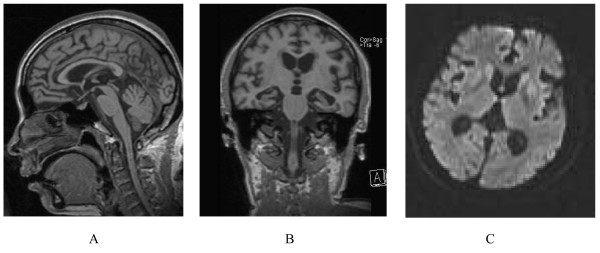Gerstmann–Sträussler–Scheinker syndrome(GSS) is an extremely rare, usually familial, fatal neurodegenerative disease that affects patients from 20 to 60 years in age. It is exclusively heritable, and is found in only a few families all over the world.[1] It is, however, classified with the transmissible spongiform encephalopathies(TSE) due to the causative role played by PRNP, the human prion protein.[2] GSS was first reported by the Austrian physicians Josef Gerstmann, Ernst Sträussler and Ilya Scheinkerin 1936.[3][4]
Familial cases are associated with autosomal-dominant inheritance.[5]
Certain symptoms are common to GSS, such as progressive ataxia, pyramidal signs, and even adult-onset dementia; they progress more as the disease progresses.[6]
 A person with inherited prion disease has cerebellar atrophy. This is highly typical of GSS.SpecialtyNeurology Symptomsdifficulty speaking, developing dementia, memory loss, vision loss.CausesprionPrognosis(AVERAGE) 5-6 years from diagnosis
A person with inherited prion disease has cerebellar atrophy. This is highly typical of GSS.SpecialtyNeurology Symptomsdifficulty speaking, developing dementia, memory loss, vision loss.CausesprionPrognosis(AVERAGE) 5-6 years from diagnosisGSS is part of a group of diseases called transmissible spongiform encephalopathies. These diseases are caused by prions, which are a class of pathogenic proteins that are resistant to proteases. These prions then form clusters in the brain, which are responsible for the neurodegenerative effects seen in patients.[10]
The P102L mutation, which causes a substitution of proline to a leucine in codon 102, has been found in the prion protein gene (PRNP, on chromosome 20) of most affected individuals.[11] Therefore, it appears this genetic change is usually required for the development of the disease.[12][13][14]
https://en.wikipedia.org/wiki/Gerstmann–Sträussler–Scheinker_syndrome
No comments:
Post a Comment